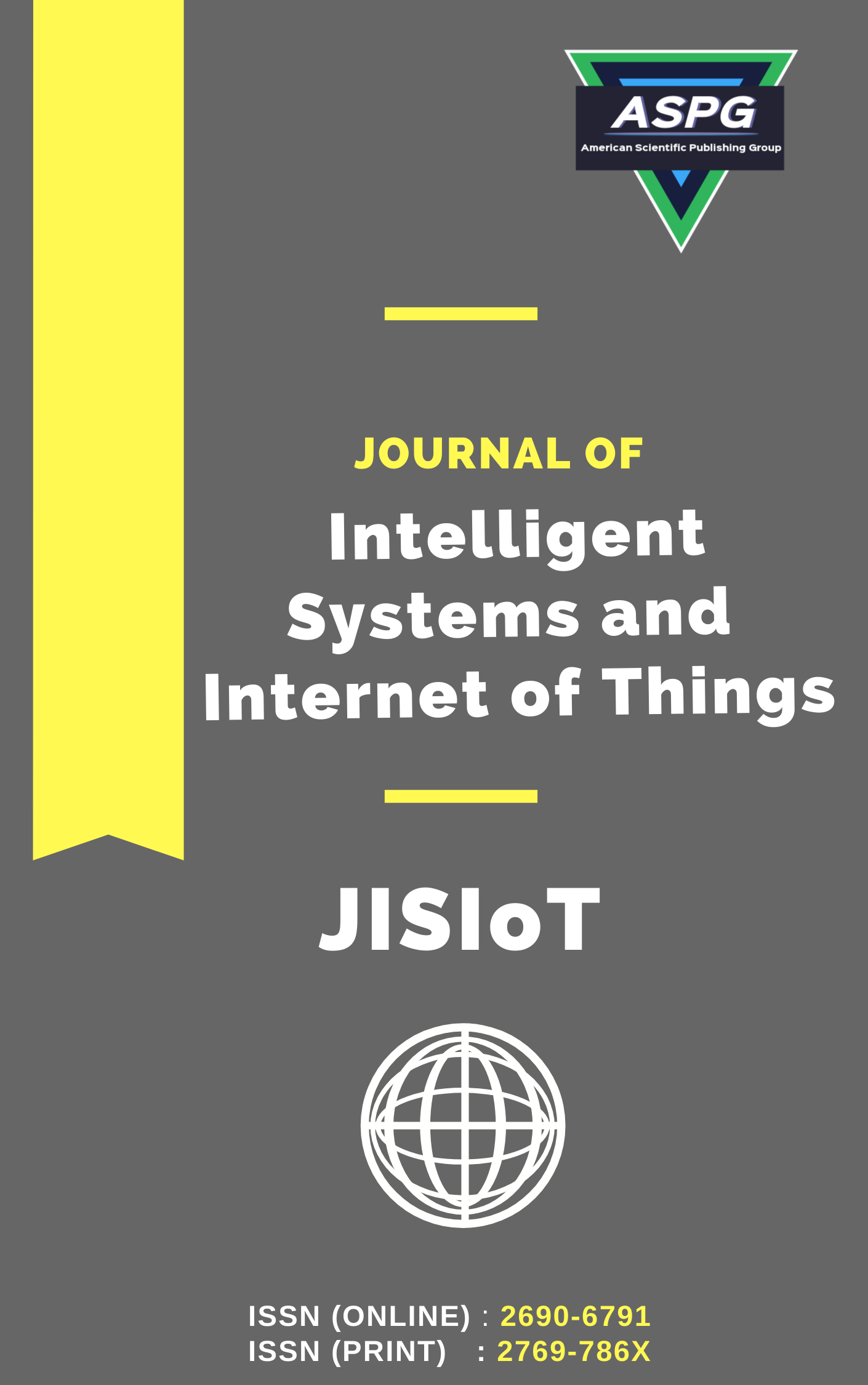

Volume 5 , Issue 1 , PP: 08-19, 2021 | Cite this article as | XML | Html | PDF | Full Length Article
Ahmed Abdelaziz and Alia N Mahmoud 1 *
Doi: https://doi.org/10.54216/JISIoT.050102
Revealing the failure of agile software projects is a great challenge faced by software companies. This paper focuses on the using of intelligent techniques such as fuzzy logic, multiple linear regressions, support vector machine, neural network to address this challenge. This paper also presents a review of some works related to this area of interest. In this paper, the researchers propose an approach for revealing the failure of agile software projects based on two intelligent techniques: fuzzy logic and multiple linear regressions (MLR). MLR is used to determine crucial failure factors of agile software projects. Fuzzy logic is used for revealing failure of agile software projects.
Agile Projects, Intelligent Techniques, Fuzzy Logic, Multiple Linear Regressions
[1] V. Lalsing, S. Kishnah and S. Pudaruth “People Factors in Agile Software Development and Project Management”, IJSEA, Vol.3, No.1, 2012, pp. 117-137.
[2] J. Li “Agile Software Development”, Technics University Berlin, Berlin, Germany, 2012
[3] John Hunt, “Agile software construction”, Springer, 2006.
[4] Ann L. Fruhling and Alvin E. Tarrell, “Best Practices for Implementing Agile Methods”, IBM, 2008
[5] Laurie Williams, Robert R. Kessler, Ward Cunningham, and Ron Jeffries, “Strengthening the case for pair Programming”, IEEE Software, 2000
[6] Mike Cohn, “Software Development using Scrum”, Addison-Wesley, 2010.
[7] K. N. Rao, G. K. Naidu and P. Chakka “A Study of the Agile Software Development Methods, Applicability and Implications in Industry”, IJSEA, Vol.5, No.2, 2011, pp. 35-46.
[8] N. R. Darwish “Enhancements in Scrum Framework using Extreme Programming Practices”, IJICIS, Vol.14, No.2, 2014, pp. 53-67.
[9] Ioannis G. Stamelos and P. Sfetsos “Agile Software Development Quality Assurance”, information science references, Idea Group Inc, 2007.
[10] V. E. Jyothi and K. N. Rao “Effective Implementation of Agile Practices”, IJACSA, Vol.2, No.3, 2011, pp. 41-48.
[11] ELZAMLY and B. HUSSIN “An Enhancement of Framework Software Risk Management Methodology for Successful Software Development”, JATIT, Vol.62, No.2, 2014, pp. 410-423.
[12] S. MERZOUK, S. ELHADI, H. ENNAJI, A. MARZAK and N. SAEL “A Comparative Study of Agile Methods: Towards a New Model-based Method”, IJWA, Vol.9, No.4, 2017, pp. 121-128.
[13] M. Al-Zawahiri, M. Biltawi, W. Etaiwi, A. Shaout “Agile Software Development Methodologies: Survey of Surveys”, Journal of Computer and Communications, Vol.5, 2017, pp. 74-97.
[14] N. R. Darwish, A. A. Mohamed and A. S. Abdelghany “A Hybrid Machine Learning Model for Selecting Suitable Requirements Elicitation Techniques”, IJCSIS, vol.14, No 6, 2016, pp. 1-12.
[15] A. A. Mohamed and A. S. Salama “A Fuzzy Logic based Model for Predicting Commercial Banks Financial Failure”, IJCA, vol.79, No 11, 2013, pp. 16-21.
[16] K. Jammalamadaka and V. R. Krishna “Agile Software Development and Challenges”, IJRET, Vol.2, No.8, 2013, pp. 125-129.
[17] TAHERDOOST and A. KESHAVARZSALEH “A Theoretical Review on IT Project Success/Failure Factors and Evaluating the Associated Risks”, Mathematical and Computational Methods in Electrical Engineering, vol.1, 2012, pp. 80-88.
[18] M. Shepperd and S. MacDonell “Evaluating prediction systems in software project estimation”, Information and Software Technology, ELSEVIER, vol.54, 2012, pp. 820-827.
[19] S. Lee and H. Yong “Agile Software Development Framework in a Small Project Environment”, JIPS, Vol.9, No.1, 2013, pp. 69-88.
[20] Tanner and U. Willingh “Factors Leading to the Success and Failure of Agile Projects Implemented in Traditionally Waterfall Environments”, MKL, 2014, pp. 693-701.
[21] Feras A. Batarseh and Avelino J. Gonzalez “Predicting failures in agile software development through data analytics”, Springer, 2015.
[22] D. S. Nguyen “Success Factors That Influence Agile Software Development Project Success”, ASRJETS, vol.17, No 1, 2016, pp. 172-222.
[23] T. Chow, D. Cao “A survey study of critical success factors in agile software projects”, JSS, Elsevier, vol.81, 2008, pp. 961-971.
[24] N. Cerpa, M. Bardeen, B. Kitchenham and J. Verner “Evaluating logistic regression models to estimate software project outcomes”, IST, Elsevier, vol.52, 2010, pp. 934-944.
[25] M. mayo, and S. Spacey “Predicting Regression Test Failures Using Genetic Algorithm-Selected Dynamic Performance Analysis Metrics”, Proceedings of the 5th International Symposium on Search Based Software Engineering, Springer, vol.8084, 2013, pp. 158-171.
[26] D. Stankovic, V. Nikolicb, M. Djordjevicc, D. Caod “A survey study of critical success factors in agile software projects in former Yugoslavia IT companies”, JSS, Elsevier, vol.86, 2013, pp. 1663– 1678.
[27] Pushpavathi T.P, Suma V, and Ramaswamy V “Defect Prediction in Software Projects-Using Genetic Algorithm based Fuzzy C-Means Clustering and Random Forest Classifier”, IJSER, Vol.5, 2014, pp. 888-898.
[28] H. Yadav, D. Yadav “A fuzzy logic based approach for phase-wise software defects Prediction using software metrics”, INFSOF, 2015, vol.1, pp. 1-19.
[29] T. Hovorushchenko and A. Krasiy “Realization of the Neural Network Model of Prediction of the Software Project Characteristics for Evaluating the Success of its Implementation”, ICIDAACS, IEEE, 2015, pp. 348-353.
[30] S. A. Rizvi, R. A. Khan and V. K. Singh “Software Reliability Prediction using Fuzzy Inference System: Early Stage Perspective”, IJCA, vol.145, No 10, 2016, pp. 16-23.
[31] V. Vashisht, M. Lal and G. S. Sureshchandar “Defect Prediction Framework Using Adaptive Neuro-Fuzzy Inference System (ANFIS) for Software Enhancement Projects”, British Journal of Mathematics & Computer Science, vol.19, No 2, 2016, pp. 1-12